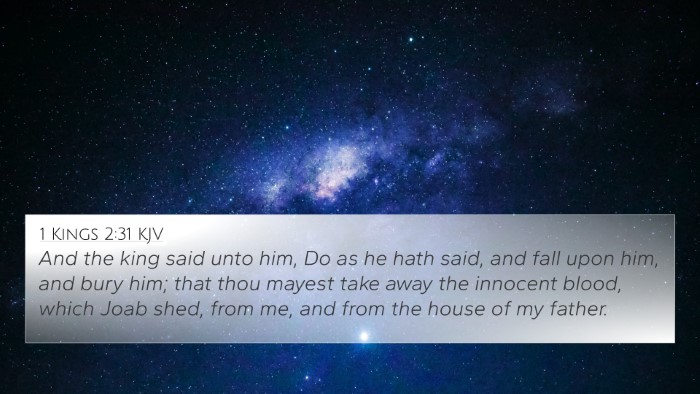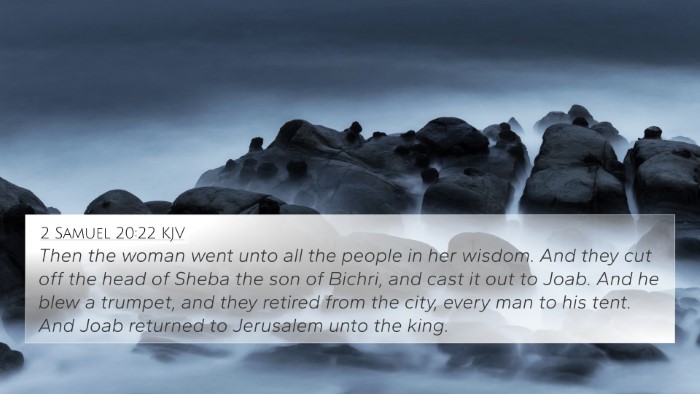Understanding Proverbs 17:11
Proverbs 17:11 states:
"An evil man seeketh only rebellion: therefore a cruel messenger shall be sent against him."
Summary of Meaning
This verse presents a clear dichotomy between the disposition of an evil person and the consequences of such a demeanor. The insight provided by Matthew Henry, Adam Clarke, and Albert Barnes emphasizes several key themes:
- The Nature of Evil: An evil man, as interpreters agree, is one who actively seeks out rebellion against righteous authority. This rebellion can take many forms, including opposition to God’s commandments and the societal structure ordained by Him.
- Consequences of Rebellion: The passage indicates that such rebellious actions invite negative repercussions. A "cruel messenger," which several commentaries interpret as a metaphorical representation of judgment or calamity, will come to exact the toll of that rebellion.
- Moral Instruction: Proverbs frequently convey moral lessons. This verse imparts a warning that rebellion against godly ways leads not only to personal ruin but also invites harsh justice, highlighting the Bible's theme of divine justice and retribution.
- The Role of Authority: The mention of a 'messenger' implies the importance of authorities established by God to carry out His will and judgments. This represents a broader commentary on the respect owed to established order and governance.
Connections Between Bible Verses
Examining Proverbs 17:11 alongside other scriptures offers deeper insights:
- Proverbs 29:1: "He, that being often reproved hardeneth his neck, shall suddenly be destroyed, and that without remedy." This verse echoes the theme of persistent rebellion leading to inevitable destruction.
- Galatians 6:7: "Be not deceived; God is not mocked: for whatsoever a man soweth, that shall he also reap." This passage ties into the concept of reaping consequences for one's actions.
- Romans 2:6: "Who will render to every man according to his deeds." Here, the idea of being judged according to one's rebellion against the truth is highlighted.
- 2 Thessalonians 1:6: "Seeing it is a righteous thing with God to recompense tribulation to them that trouble you." The relation to divine retribution is evident, marking a thematic parallel.
- Isaiah 3:11: "Woe unto the wicked! It shall be ill with him: for the reward of his hands shall be given him." This verse reinforces the concept of judgment against the malicious acts of the wicked.
- Ezekiel 18:30: "Therefore I will judge you, O house of Israel, every one according to his ways, saith the Lord God. Repent, and turn yourselves from all your offenses." This emphasizes the need for repentance from rebellion.
- James 4:6: "But he giveth more grace. Wherefore he saith, God resisteth the proud, but giveth grace unto the humble." Here, the contrast between pride (rebellion) and humility (submission) is presented.
Comparative Bible Verse Analysis
In studying Proverbs 17:11, we see that it is part of a larger narrative about good versus evil - a prevalent theme throughout the Bible:
- Thematic Connection: The evil person's rebellion is opposed to the virtue of wisdom, which Proverbs often extols. Proverbs 1:7 states, "The fear of the Lord is the beginning of knowledge: but fools despise wisdom and instruction."
- Old Testament Links: Revelations of God’s response to human rebellion can also be seen in the narratives of Israel’s disobedience leading to exiles and prophets like Jeremiah voicing God’s impending judgment.
- New Testament Reflections: The New Testament often reflects the principles found in Proverbs, as seen in the teachings of Christ about the consequences of actions and the importance of aligning with God’s will.
Tools for Bible Cross-Referencing
For those seeking to further study Proverbs 17:11 and its implications closer or broader within the Biblical framework, here are some tools and tips:
- Bible Concordance: Use a concordance to locate keywords from Proverbs 17:11 and find related verses.
- Bible Cross-Reference Guide: Guides that identify thematic and contextual connections can greatly assist in drawing relationships between verses.
- Cross-Reference Bible Study: Dedicate time to exploring how this verse connects to complementary and contrasting messages across the Bible.
- Cross-reference Bible Study Methods: Methods such as thematic studies, grouped studies by topics, and authorial studies can unlock deeper meanings.
Conclusion
Proverbs 17:11 serves as a cautionary tale highlighting the consequences of rebellion against divine authority, echoing throughout scripture. As you seek to interpret and understand the connections within your studies, consider not only the direct meanings but also the broader context that threads this wisdom through both the Old and New Testaments.
As you explore the Bible, remember to utilize cross-referencing to discover the interconnected nature of scripture, enriching your spiritual understanding and application.














